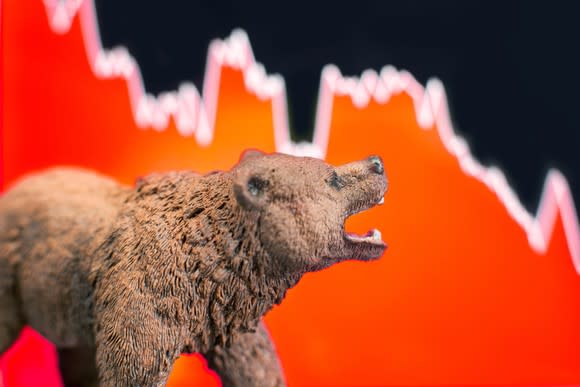3 Safe Dividend Stocks to Buy in a Bear Market
The S&P 500 teetered on the brink of a bear market at the end of 2018, and over half of the index's individual stocks had already fallen by 20% or more. That downturn, which was exacerbated by escalating trade tensions with China and clashes between President Trump and the Fed, caused many investors to flee toward conservative stocks that fare better during bear markets.
I don't think investors should abandon all their growth stocks yet, but it's prudent to hedge your portfolio with bear-market-friendly stocks that pay consistent dividends. Here are three stocks that fit the bill: General Mills (NYSE: GIS), Philip Morris International (NYSE: PM), and Cisco (NASDAQ: CSCO).

Image source: Getty Images.
General Mills
General Mills' massive portfolio of packaged foods includes Cheerios, Yoplait, and Haagen Dazs. The company has struggled to generate consistent sales growth in recent years as consumers have shifted toward healthier products and local brands, but it's been acquiring other brands -- like organic food maker Annie's and premium pet food products maker Blue Buffalo -- to counter that slowdown.
General Mills expects flat to 1% growth in organic sales this year, and for its reported revenues -- boosted by the Blue Buffalo acquisition -- to rise 9%-10% on a constant currency basis. It expects its constant currency adjusted EPS to be flat to down 3%.
Those growth rates seem soft, but General Mills' organic sales and earnings growth could improve over the long term after it fully integrates Blue Buffalo's recession-resistant business. An economic downturn could also cause customers to pivot from pricier brands back toward General Mills' more affordable products.
Until that happens, General Mills investors can hold the stock and collect a forward dividend of 5%. General Mills has raised that dividend annually for 14 straight years, and it spent just 57% of its free cash flow (FCF) on those payments over the past 12 months. General Mills' high yield and its low forward P/E of 12 should limit its downside potential when the bear finally bites.
Philip Morris International
Philip Morris International, the second largest publicly traded tobacco maker in the world, was spun off from Altria (NYSE: MO) over a decade ago. PMI sells its flagship Marlboro cigarettes and other brands overseas, while Altria remains in the US.
This means that PMI can expand in countries with higher smoking rates and avoid tighter regulations in the US, but it remains heavily exposed to fluctuating exchange rates and regional economic headwinds.
Shipments of PMI's traditional cigarettes declined in recent quarters, but it offsets those declines with price hikes, lower manufacturing costs, and other cost-cutting initiatives. It's also expanding its IQOS lineup of heated tobacco products to offset its weaker shipments of traditional cigarettes.

Image source: Philip Morris International.
That's why analysts still expect PMI's revenue and earnings to rise 3% and 6%, respectively, this year. Those growth rates might seem low, but PMI's stock looks cheap at 13 times forward earnings. More importantly, it pays a whopping forward dividend yield of 6.8%, and it's raised that dividend every year since its split with Altria. That streak should continue, since it only spent 81% of its FCF on its dividend over the past 12 months.
Cisco
Cisco is the largest manufacturer of networking routers and switches in the world. Those are usually slow-growth commodity businesses, but demand for those products -- along with its wireless hardware -- has accelerated in recent quarters on higher demand from enterprise campus and data center customers.
Cisco has also been expanding its portfolio beyond hardware with cybersecurity, collaboration, and other enterprise software, which it bundles with its routers and switches. That strategy locks in customers and widens its moat against rivals like Huawei and Arista Networks.
Cisco also repatriated most of its overseas cash to the US last year, which it's spending on buybacks, dividends, and bigger domestic acquisitions. Those moves help Cisco boost its EPS growth, tighten up its valuations, and expand its portfolio of higher-growth services. That's why analysts expect Cisco's revenue and earnings to rise 5% and 17% this year, which are high growth rates for a stock that trades at just 13 times forward earnings.
Cisco currently pays a forward dividend yield of 3.1%, and it's raised that payout annually for eight straight years. It spent just 45% of its FCF on that dividend over the past 12 months, so it has plenty of room for future hikes.
Get some bear repellent
These three stocks, while recession-resistant, could certainly decline further during a bear market. However, their high dividends and low valuations should limit those declines, and help them rebound as the market recovers. Until that happens, investors can collect the dividends as income or reinvest them to take advantage of dollar-cost averaging in a down market.
More From The Motley Fool
Leo Sun owns shares of Cisco Systems. The Motley Fool owns shares of and recommends Arista Networks. The Motley Fool has a disclosure policy.

 Yahoo Finance
Yahoo Finance 